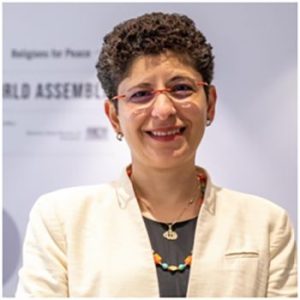
I recently took office as Secretary General of the largest global interfaith organization: Religions for Peace.
Its six inter-religious councils (IRCs) are composed of the most senior leaders representing their religious institutions in 90 countries.
This was one week before we had to ask all employees to work from home, in compliance with New York State law.
As an individual who feels functional with direct and open communication, where I can get a sense of the people I am talking with, having to take leadership over an office of people I can no longer be with, feels a little like trying to run with legs tied together. It can be done, but it is tough.
This is now the new normal, not only in the US, but everywhere in the world. For the first time in recorded human history, coming together – even within and among nuclear families – is a dangerous option, literally done at the risk of health and lives.
What does the ‘new normal’ mean, for humanity?
Thanks to more governmental regulations designed to ‘flatten the curve’ of a deadly and racing rate of Covid-19 infections, ‘social distancing’ is identified as the only viable option until a vaccine can be developed and given. Social distancing literally means not being in the presence of one another.
In the last decade, several people around the world were learning to communicate, both professionally and personally, via electronic means, which enabled us to ‘see’ each other, while being thousands of miles apart.
Some institutions were trying to move to reducing their carbon footprint from travel, by hosting more meetings/conferences/presentations on-line.
But this was only occasionally done. And it bears mention that when this was done, the sense was invariably coloured by some dissatisfaction for those of us who appreciate actually being in the same space with those with whom we can see and speak.
Most theories of communication insist that nothing can replace being together, and seeing one another face-to-face. Even corridor talk can often make the difference between a peace deal and a continuing war.
This hampering of our ability to be in the presence of one another on a regular basis will definitely contribute to changing the world forever.
As business, finance, education, civic action, religious services, governance, intergovernmental affairs, almost every profession including even many forms of health care, now move irrevocably to almost total and complete reliance on virtual communication, our words will matter more than ever.
What we say, the words we choose and use, and how we use them, will matter even more than they already did. And they already matter plenty, as increasing norms around ‘email etiquette’ also testify for instance.
Use of words, by political and religious leaders in particular, already makes a big difference to the perception of impact and capacity. Some politicians are under heavy criticism for how they are reacting to the Covid-19 crises. Few are praised.
These perceptions are not only based on the laws and regulations being put in place (and when or how these happen). A great deal of value is also placed on the words used.
Words have an impact on human consciousness, something scientists have long studied, and many researchers and health services are committed to. Articulation and eloquence have long defined culture.
And ‘having a way with words’ is a way of either praising special capacity – or bemoaning ‘spin’. Words, and how they are used, form a large part of what many bemoan as ‘fake news’.
So, we know that words matter. Now that we move into virtual communication for everything from trade to learning, from industry to worship, words will matter more than ever.
It is time to learn how to speak with mercy, how to raise interest and make deals with words, how to speak truth to power, heal wounds, raise alerts, voice concerns, convince and impact, even how to show deep love, all with words.
Faith – in anything, from a government and political leader, to a policy, to public advocacy, to all manner of relationships – will have to be elucidated and demonstrated through the word. Never before, have words mattered to so many at all times.
It is time to pay attention, therefore, to how we use the word. It’s time to listen, and learn, from some of those who come from the oldest professions of using, and understanding, and translating, the ‘word’.
Faith leaders themselves are learning to communicate to their communities and congregations, manage worship, very differently – but still very much rooted in the ‘word’.
This is why Religions for Peace has issued a call to all faith leaders from all traditions, ages, regions, and identities, to raise their voice in prayer for and with one another, and to share narratives and stories of love, in times of Covid.
For it is time for the kind words to overflow – to express love and realise healing for this Earth and for one another.
As we gaze upon this world, we recognize we have to contribute to new beginnings for all life. And in the beginning was the ‘word’.
And regardless of where we stand or what mission we serve, the word now has to be love / mercy / compassion / dignity for all life. This is the change we must realise to survive – and in Maya Angelou’s words, ‘to thrive’.
Dr Azza Karam, a former UN official, is now Professor of Religion & Development (Vrije Universiteit Amsterdam) and Secretary-General of Religions for Peace International. Based in New York, she is a member of the Centre’s International Advisory Panel. This column is adapted from her article in IPS News Agency (25 March).

0 Comments